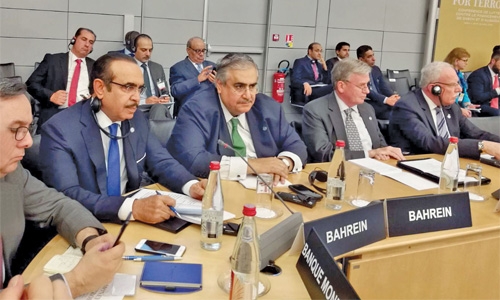Bahrain, world nations to fight terror financing
Manama : Bahrain yesterday jointed world nations in pledging support to bolster efforts to fight terrorism financing associated with the Islamic State group and Al-Qaida.
This came during a conference held by the Organisation for Economic Co-operation and Development (OECD) in Paris under the title “No Money for Terror” with the participation of more than 70 countries.
Interior Minister Lt-General Shaikh Rashid bin Abdulla Al Khalifa and Foreign Minister Shaikh Khalid bin Ahmed Al Khalifa represented Bahrain at the conference.
The two-day event was convened by French President Emmanuel Macron to coordinate efforts to reduce the terror threat in the long-term.
U.S. Treasury Secretary Steven Mnuchin, IMF chief Christine Lagarde, and Saudi Foreign Minister Adel Al-Jubeir were all present.
Participants at the conference agreed to “fully criminalise” terror financing through effective and proportionate sanctions “even in the absence of a link to a specific terrorist act.”
Iran sponsored terrorism
Interior Minister Lt-General Shaikh Rashid informed the conference participants about the terrorist activities witnessed by Bahrain in the last few years and the UN member state responsible for it, which is Iran.
He said that in 2015, for violations of banking laws, the Central Bank of Bahrain had to place the “Future Bank”, under its administration and for its links to terrorism-financing.
Role of Future bank
In 2016, two Iranian shareholders of the Future Bank - Bank Saderat and Bank Melli - sought an arbitration in The Hague. “While preparing our defence, investigators found that Future Bank’s management was involved in the following violations: Laundering $4.7 billion through ‘wire stripping’ SWIFT messages, laundering $2.7 billion through an old method of inter-bank messaging, using hard one-time codes and physical delivery, granting international business loans, issuing letters of credit and trade finance guarantees worth $1.5 billion that violated the international law, and disbursing funds through illegal means in Bahrain to strengthen the Iranian influence in the country,” the Minister said.
He said that this amounted to almost $9 billion. “Those amounts we found that reached those involved in terrorist acts. We confiscated the funds in dead points meant for those assigned to carry assassination tasks.”
The Interior Minister said that Bahrain continued to contribute to the international efforts to fight extremism and terrorism and drying up their financing sources. He also highlighted his support for the formation of the International Counter-terrorism Financing Centre in Saudi Arabia and looked forward to co-operating with that institution.
Foreign Minister told the conference that Bahrain was among the first countries to make a call to fight terrorism-financing and held an international conference in Manama in 2014.
The Minister called for the reinforcement of coordination between all countries to tackle terrorism and adopt new multi-dimensional methods to achieve integration based on common principles to contain and check terrorism and fight violence, terrorism and extremism in the social media.
He also made a call to deal with terrorist groups such as Hezbollah, especially those supported by other countries, to eliminate them and list their members and entities in the international terrorism list.
Daesh and Al Qaeda
Macron, who has returned to France from a state visit to the United States, asserted in a speech that Daesh and Al Qaeda are the two corners of terrorism, adding that the current battle against terrorism is a field one and an approach should be determined to dry up the sources of terrorism financing.
“When we have information — for example, the U.N. list of individuals and entities financing terrorism — we need to make sure measures like asset freezing are implemented fully and quickly,” Lewis said.
Participants called for better information-sharing between intelligence services, law enforcement, financial businesses and the technology industry. They also agreed to improve the traceability of funds going to non-governmental organizations and charity associations.
The participants issued a final statement “Paris Declaration”, stating the importance of an integrated approach to combating terrorism and its financing with the protection of joint efforts to fight terrorism financing. They affirmed the commitment to stop the funding of individual terrorists and terror groups that are linked to Daesh and Al Qaeda.
The French organizers noted that IS military defeats on the ground have not prevented the group from pursuing its terrorist activities, along with al-Qaida —especially in unstable regions of Afghanistan, Malaysia, the Philippines, Yemen, Egypt and sub-Saharan Africa.
Terror groups don’t only rely on the cash economy — they’re using increasingly hard-to-track tools like prepaid cards, online wallets and crowdfunding operations.
The IS group has also invested in businesses and real estate to ensure its financing. Islamic State revenues alone were estimated at $2.5 billion between 2014 and 2016, according to the French president’s office.
Though most of the attacks in Western countries do not cost a lot of money, a French official said terror groups “behave like big organizations” in that it “costs a lot to recruit, train, equip people and spread propaganda.” The official was speaking anonymously under the presidency’s customary practice.
Related Posts

